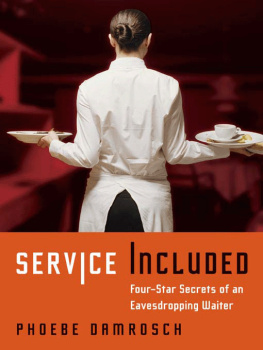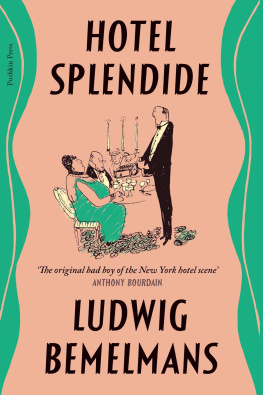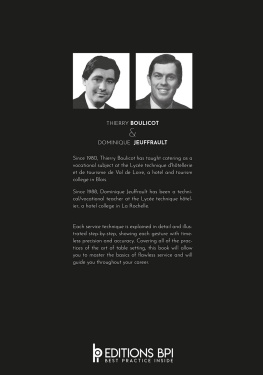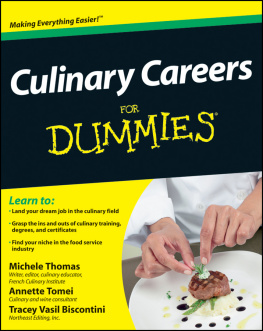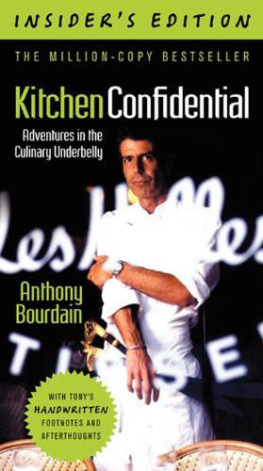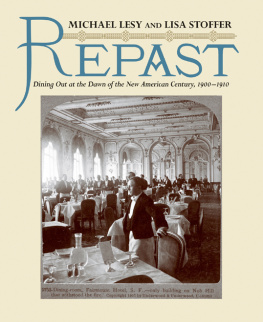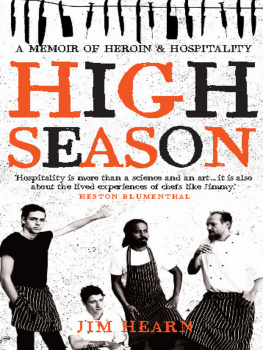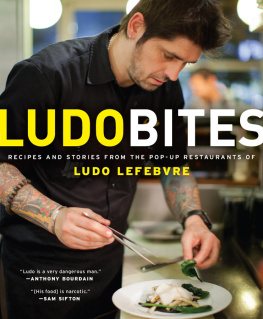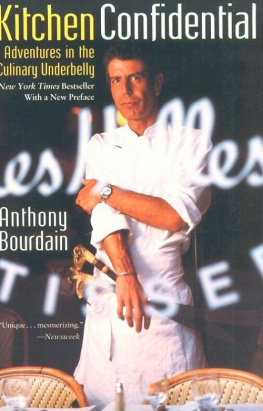SERVICE INCLUDED
Four-Star Secrets
of an
Eavesdropping Waiter
Phoebe Damrosch

For Andr, who is just right
contents
- The right to have your reservation honored
- The right to water
- The right to the food you ordered at the temperature the chef intended
- The right to a clean, working bathroom
- The right to clean flatware, glassware, china, linen, tables, and napkins
- The right to enough light to read your menu
- The right to hear your dining companions when they speak
- The right to be served until the restaurants advertised closing time
- The right to stay at your table as long as you like
- The right to salt and pepper
i USUALLY SKIP introductions and plunge right into the first chapter. At the end, if I loved the book, I savor everything to delay its inevitable closeeven the history of the font. I imagine that reading an introduction at the beginning is like dunking a toe in to check the literary temperature. Your toe, in this case, will experience: an ambiguous disclaimer about fact and fiction, a feeble attempt to summarize this book, an explanation of the title, and a statement of prophylactic contrition.
As to the slippery subject of nonfiction, all I can say is that this book contains the truth according to my memory, with the following exceptions: consolidation of conversations, time, and two characters. I altered a few names and incriminating details and left a great deal out, mainly that which would have embarrassed, angered, or hurt people unnecessarily.
While I worked on this project, well-meaning friends and acquaintances asked what I was writing about, a question for which I was always ill-prepared. At first I told outrageous lies (see City Love). After lying backfired, I tried to be vague: Its about restaurant culture. When pressed, I gave a laundry list of topics: food, fine dining, love, jealousy, New York, late-night grazing, guests, cookbooks, critics. Eyes glazed over. The next approach was reverse psychology. This book is not a sepia-toned portrait of my grandmother in the kitchen making meatballs, samosas, congee, or empanadas. It is not a how-to; you will find nary a recipe, nor will you learn to bone, butterfly, boil, or braise. It is not a history of great breadth; most of the story occurs within an eighteen-month period.
After I left Per Se restaurant, the setting of this book, a former colleague passed along a story that the chef told the staff. If you want to understand commitment, he explained, all you have to do is look at the American breakfast of bacon and eggs. The chicken was involved, but the pig was committed.
This is a story about commitment: to food, service, love, perfection, and to being the bacon.
Rated PG: May contain material offensive to Republicans, vegans, pharma ceutical lobbyists, and those on a low-sodium diet. Animals were harmed during the writing of this book.
e VENTUALLY I HAD to accept that I wasnt working in restaurants to support my art like most of my coworkers; I was posing as an artist to justify my work as a waiter. The small caf where I worked in Williamsburg, Brooklyn, employed artists as if there were quotas to be met: a drummer, a filmmaker, an actor, a dancer, a photographer, a designer, and myselfwho at that point fancied herself a writer. Every so often someone would go on tour, decide to move back to some small town in some small state, or simply leave out of frustration with what he or she wasnt getting to do. Its a dangerous combination, this dichotomy of artist/waiter, one that often leads to listless service and half-finished Margaritas forgotten behind the computer.
I lived in a studio apartment upstairs from my high school sweetheart in Williamsburg (recently rated the hippest neighborhood in Americahow scientific a study that was, I hardly know). We had broken up three years before and were now pretending to be friends, sharing a computer and sweaters, buying groceries, building bookshelves, and sabotaging each others love life. That we spent most of our time together in the kitchen was no surprise; food had always been our bond. Between our early experimentations and our reunion years later, we had grown confident in our techniques and ambitious in our undertakings, mastering emulsifications and reductions, the art of kneading, and the importance of letting things rest. He played the chef, and I the visionary, reading recipes out loud from the floor, my back against the refrigerator door.
When I found myself without a job, my ex-love suggested that I interview at the caf where he worked. I would shoot for a busboy position since I had no experience in the business. When the manager asked if I knew how to make a cappuccino, I said in all seriousness that I didnt, but that I drank a lot of them. I have no idea why she hired me.
The caf modeled itself after a funny amalgamation of cultures, from its curved mosaic ceiling to the eclectic cuisine, which I called Middleterranean: scrambled eggs with coriander and ginger, lamb shank with currants and pine nuts, salmon on Israeli couscous. Having just escaped my last job on Fifth Avenue with my sanity intact (Ill get to that), I pierced my nose, dyed my new pixie cut a dramatic platinum blond, and took to keeping my corkscrew, or wine key, tucked into knee-high boots. The caf was perhaps best known for brunch, when the line ran out the door and we mastered the art of sprinting while balancing three or four coffee cups. Bed-headed hipsters make challenging brunch guests, barely able to utter their Bloody Mary order, let alone abide a wait for their eggs Barbarosa with crawfish and chorizo. Margaritas were essential to survival.
I was the only busboy not named Mohammed. Here, as in many restaurants around the city, any deviation from the distinct class/race hierarchy makes everyone uneasy. In most New York restaurants, the chef is Caucasian, the waiters are starving artists, the busboys are from Bangladesh, and the kitchen workers and dishwashers are from Latin America. I honestly think I was promoted so quickly from busboy to waiter because the chef and the waiters felt uncomfortable asking me to mop up their spills, take out the trash, and clean the windows. I certainly wasnt promoted for my skill or knowledge. When I came to the kitchen to pick up a salad, the cooks took a moment longer to anchor the teetering greens between beet support beams. They knew that when I picked up a bowl of soup the crostini, which was supposed to remain on the rim of the bowl, would be launched like a life raft into turbulent waves of soup. The foam on my soy chai resembled dish suds. I thought Cristal was a china company.
And yet, what better way to begin my career in the business than with a restaurant rife with clichs: roaches in the dry goods, mice everywhere, shady finances, messy love affairs, drugs, theft, basement flooding, and chefs with a penchant for throwing pots, pans, and produce. I lasted more than a year, in which time I saw at least ten waiters and two chefs come and go. We were always out of more than half the wines on the wine list and often couldnt locate the other half. The reservation system was a pile of Post-its.
When the neighborhood really started to boom and became saturated with new restaurants even hipper than ours, business lagged. The owners, whose only restaurant experience had been to piece this one together with duct tape and borrowed money, responded by hiring a real manager. They couldnt afford a seasoned one, so they found a cheap one. Enter Jessica, a smoky twenty-four-year-old with a severe bob and a crafty, brooding look. She fit right into the scene, with her leg warmers and short skirts, her carefully smudged eyeliner, and a tube of red lipstick she used as a bookmark in the new reservation book. Within months, both her drug habit and the fact that she was sleeping with the chef were common knowledge. One day she simply disappeared, leaving behind one black sneaker and a mirror. For a while, I took over many of her responsibilities: ordering wine, scheduling the Mohammeds, and planning private parties. The more involved I became in the business, the shadier I realized it was. We owed money to everyone and paid them off only when we needed to order something else.
Next page
